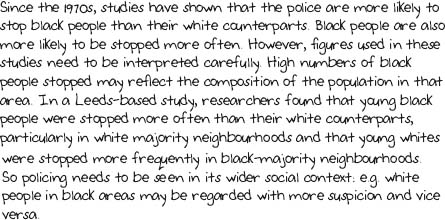8.2 Writing in your own words
Active reading, or reading and thinking, are bound up with writing in your own words. If you read materials in a passive way, you are much more likely to copy out chunks word for word when you are note taking, and in the process generate very long notes indeed! Similarly, if you do not spend time thinking about what you have read, asking questions and checking your understanding, you will be tempted to copy out difficult bits or simply try to reorder the author's words. In the latter case you run the risk of changing the whole meaning of what the author is saying in the process. So, in order to develop the skill of writing in your own words you need to read actively, processing meanings as you go.
Activity 10
Have a go at writing in your own words. Actively read the short extract from Hazel Croall reproduced below which focuses on the issue of ‘race’, ethnicity and crime again, but this time explores the issue of police contact. You may need to read it through more than once, but then look away from the screen (or print-out if you have chosen to print the reading) and try to summarize the main points in your own words. Afterwards, click the "Now read the discussion" link beneath the article to read our comments and feedback.
Reading 4
Hazel Croall: ‘Race, ethnicity and crime’
Police activity
Since the 1970s, successive studies have reported that black people are more likely than white to be stopped by the police and are also likely to be stopped more often (Stevens and Willis 1979; Smith and Gray 1985; Jefferson and Walker 1992). These figures also have to be interpreted with caution. They may reflect the social composition of the area in which they are carried out. Ethnic groups tend to be concentrated in specific areas of towns and cities and figures based on a large area may not reflect local differences which can be revealed by looking at smaller areas (Walker 1987). In a study based in Leeds, Jefferson and Walker found that, for Leeds as a whole, black youth were stopped more often than white; but black youth were stopped more often in areas where the majority of residents were white, and white youth were stopped more often in areas dominated by black people and Asians. These variations could be a feature of the local context of policing. The police could, for example, regard a black person in a white area with greater suspicion, or be more careful about stopping black people in a black area. Alternatively, minority populations in any area may be more transient, more likely to live in temporary accommodation and therefore be seen as more worthy of police attention (Jefferson and Walker 1992; Holdaway 1996).
References
Holdaway S (1996) The Racialization of British Policing. London: Macmillan
Jefferson T and Walker M (1992) ‘Ethnic Minorities in the Criminal Justice System’, Criminal Law Review, 83–8
Smith D J and Gray J (1985) Police and People in London: The PSI Report. Aldershot: Gower
Stevens P and Willis C (1979) Race, Crime and Arrests. Home Office Research Study No 58. London: HMSO
Walker M (1987) ‘Interpreting Race and Crime Statistics’, Journal of the Royal Statistical Society, Part 1: 39–56
Discussion
We read through the extract twice and then turned away. Our attempt at re-presenting the main ideas generated the following:
Of course our words will not be your words. Nevertheless, they serve to illustrate how writing in your own words involves re-presenting ideas in a slightly different way, perhaps in a different order and with some of the detail missed out. Remember, you can always go back and check that you noted down all the main points and add to your notes as necessary. We went back to the extract and thought that it would be useful to note down the names of the researchers in the Leeds study so that we could use and reference it in an assignment perhaps at a later date. Similarly, we thought that we could add details of at least one of the studies mentioned at the very beginning of the extract. The key, then, is to make your notes your own and not be seduced by the smooth words of the authors into copying.
That said, the need to develop the skill of writing in your own words does not mean that it is never acceptable to use an author's words. Nor does it mean that you never need acknowledge the sources that you draw upon.

